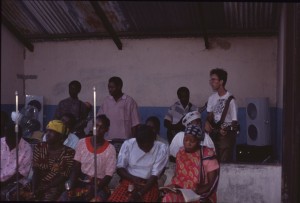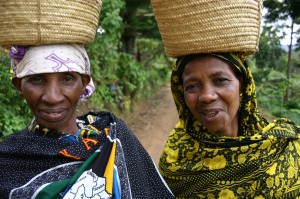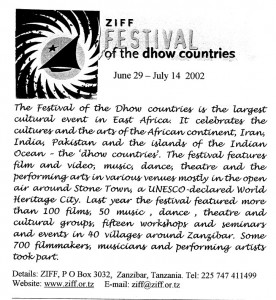British High Commissioner Richard Clarke has announced that Britain will increase assistance to small and medium enterprises. This followed a one-day tour he made of such enterprises in Dar es Salaam. He noted also that Tanzania’s trade to EU member countries had reached a surplus for the first time ever last year and its exports to Britain had surpassed last year’ exports by 27%. -Guardian.
Some 130 students from Tanzania were stranded in Nairobi after they were promised admission to American colleges. It is said that one bishop of an unknown church collected Shs 130 million from them. He then took them to Nairobi and put them up at the YMCA hostel while “arrangements” were being made for visa and travel to the USA. (Nipashe)
Pharmacies have been told to stop selling Chloroquine drugs following the introduction of SP as the first line of treatment for malaria. SP includes drugs such as Fansidar, Falcidin, Laridox, Orad or and Metakelfin -Guardian.
The Ministry of Health has issued a statement saying that visitors to Tanzania are no longer required to provide certification for yellow fever. The government has scrapped all health desks at the country’s borders and airports. However in Zanzibar visitors may still be asked for the certificate.
Residents of Kwimba, Mwanza Region, were quoted in the Guardian as being optimistic that, as the use of biogas technology spreads, the widespread killing of old people suspected of witchcraft will come to an end. One old lady said that the ‘bad old days of red eyes’, caused by wood fires in her hut were now over.
The High Court has ordered the government to pay Shs 300 million in damages to the family of General Komba, a former Director of National Intelligence, who was shot dead by two policemen in 1996 Majira.
At a Koranic recitation competition, an initiative of the Tanzania Muslim Council (BAKWATA) and the World Muslim Congress, the Chief Director of the latter for East and Central Africa, Sheikh Muhamad Lukala, said that the ceremony was aimed at rewarding the best Koran readers and alerting Muslims to religious ethics. Young boys and girls from different Madarasa, Government and Islamic schools were required to learn by heart parts of all 114 chapters of the Holy Koran but, in fact, most only knew by heart between 5 and 15 chapters. Minister for Labour, Youth Development and Sports Professor Juma Kapuya said that due to their neglect of the Koranic code, many Muslims were committing wrongs in various parts of the world. Hatred, and acts of revenge were strictly prohibited in the Holy Book.
More than 50 tons of maize on the farm in Butiama belonging to the late Mwalimu Nyerere, is reported in Mwananchi to have remained unsold because of a glut of supplies. It had previously been sold to prison department and secondary schools.
At a Britain-Tanzania Society showing in London of a video (November 28) of the emotional scenes at the agreement signing ceremony in Zanzibar, one member of the audience suggested that the two party secretaries-general should be called in to help in Northern Ireland. Another added: “and Afghanistan!”
Makongo secondary school student George Mwasalwiba has won a $20,000 award from the International Society of Poetry in the USA and was invited to travel to Washington to receive his award. He wrote a poem entitled ‘Africa is Weeping’ about the AIDS epidemic. At the finals of the Commonwealth Vision awards in London on November 20 a short video from Tanzania by Maria Tschai entitled ‘Fruits’ was ‘Highly Commended’ She portrayed the diversity of the Commonwealth through images of fruits -watermelons, mangoes, apples and grapefruits.
Geoffrey Stokel has sent us a report from the Wantage Herald indicating that former British High Commissioner Sir Colin Imray has become the High Steward of Wallingford.
During the last three years eight black rhinos (one male) have been transferred from South Africa to a protection site at the Mkomazi Game Reserve for breeding -East African.
The East African’s Charles Onyango-Obbo (December 3) has been imagining an ideal East African state. Extracts: ‘I would choose the Dar es Salaam city managers to run the capital…I would pick Mkapa to lead the government …..I would come to Uganda for its policy on Aids…. Kenya for economic resilience without donor aid…. In the same issue the UN Centre for Human Settlements was reported as having compared crime in East and South Africa….. Dar es Salaam – fairly similar to Durban… Nairobi – very bad – and about the same as Johannesburg …..of those interviewed in Dar, 6% felt unsafe walking about during the day (61% in Nairobi) and 61% feared walking about at night (Nairobi 75%) ….
Tanzania’s Amelia Jacob, described as an indomitable campaigner for people living with HIV/Aids and herself HIV positive, has been awarded the 2001 Africa Prize for leadership by the US-based ‘Hunger Project’ Africa Today.
The well-known newspaper publisher Jenerali Ulimwengu who was declared not to be Tanzanian has been granted a Class A Residence Permit as a foreign investor -Guardian.
Vodacom has come to the rescue of the Football Association of Tanzania by agreeing to sponsor its Premier League in 2002 -Guardian.



